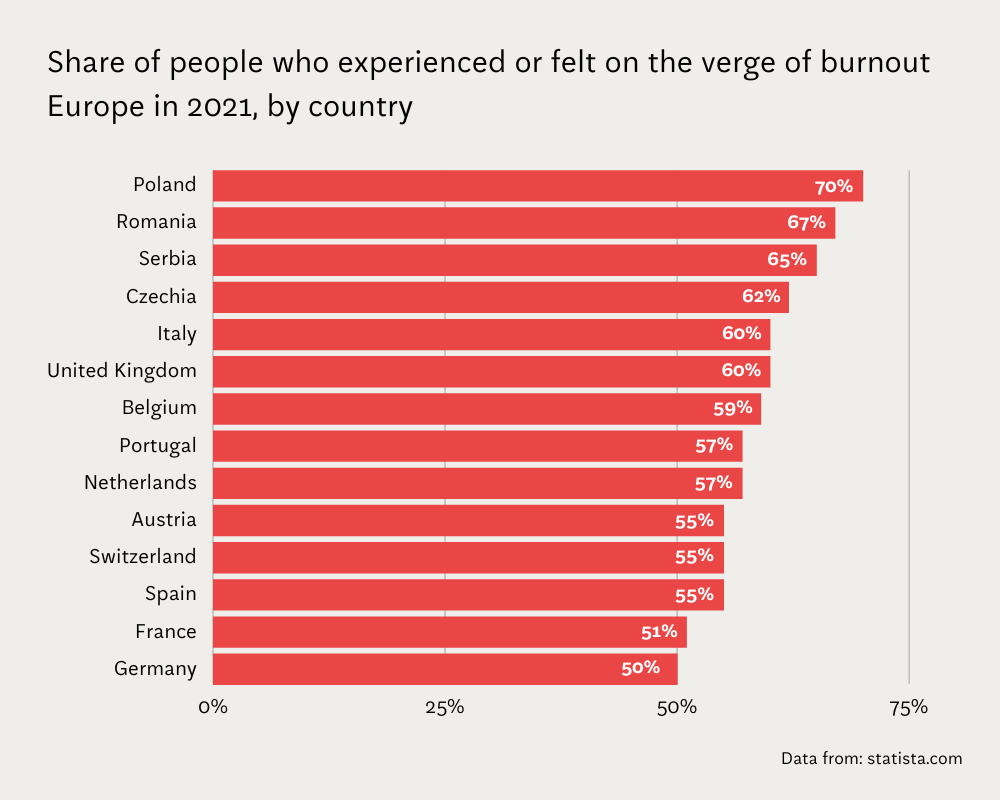Job burnout (or professional burnout) is a serious mental condition. How can you deal with it? What should you know about it? Let's have a look.
Professional burnout is a severe type of emotional, physical and mental exhaustion. It occurs mostly among people engaged in intensive work or stressful professional activities. According to market research, job burnout is a common issue in the IT world:

Discover the symptoms of job burnout
The truth is the first symptoms are frequently overlooked. After all, who never had any problems with getting to work early in the morning? However, if your discouragement persists, you ought to take a closer look at your situation [1].
Christina Maslach, a well-known psychologist working at the University of California, claims that burnout can be divided into three major stages:
Stage 1: Emotional exhaustion
This stage is characterised by fatigue and aversion to work, loss of strength, procrastination, constant tension, and mood swings.
Stage 2: Depersonalisation
This stage is mostly based on the loss of sensitivity towards others. It is psychological distancing from superiors, co-workers and clients. For a person at this stage, relationships at work are becoming more superficial, formal and cynical, sometimes even filled with anger.
Stage 3: Loss of faith in yourself and your achievements.
At this stage, the employee doubts their own achievements and professional competencies and questions the meaningfulness of their work[2].
Reasons for professional burnout
According to data published by Statista, job burnout is common across Europe. However, there are four countries where this phenomenon affects over 60% of surveyees: Poland, Romania, Serbia, Czechia.
When you take a look at Poland, you will see a clear correlation between the amount of time spent at work and job burnout. And Poles surely do work a lot. According to Eurostat data from 2021, an employee in Poland worked an average of 40.4 hours a week. This is the third-highest score among the 28 countries surveyed by Eurostat!
In 2021, only the Greeks worked more than Poles (on average, 41.3 hours a week). And right behind us was Romania, with a score of 40.2 hours, which is also the number two country on the job burnout chart:

On the other hand, the least burned-out country is Germany, with a result of 50%. Simultaneously, Germans spend less time at work (on average, 34.5 hours per week[3]).
Who’s (or what’s) to blame? Usually, there are three major reasons for job burnout:
- Too much work
- Too fast lifestyle
- Pressure for success
Other reasons comprise organisational changes, pressure at work, deadlines, work conflicts, lack of work-life balance, lack of self-development and lack of motivation on the employer's side.
According to aforementioned Christina Maslach, the working environment itself plays a big role here. If it is hostile, stressful and too emotionally and psychologically demanding, it is conducive to job burnout. Therefore, the responsibility for the employee's well-being does not rest solely on them but also on the shoulders of the entire company.
The work specificity in IT also plays a vital role. Long hours spent at the computer and lack of contact with other people can also cause job burnout.
Why should employers take care of their employees’ well-being?
Undoubtedly, the job burnout problem shouldn't be underestimated.
For starters, from the employee perspective, job burnout is detrimental to their whole life. It results in the deterioration of the comfort of life, depression and disturbance of family ties.
On the other hand, for the employer, job burnout results in overtired, cynical and discouraged employees who don't work as effectively as they could in a more friendly and balanced workplace.
Job burnout results in [4]:
- Avoiding contact with others
- Low self-esteem
- Problems with sleeping
- Mood swings
- Depression
- Cynicism
- Health problems
- Tendency to overuse drugs
The results for the company are also worth noting [5]:
- Negligence in the performance of everyday duties
- Low quality of work
- Impatience
- Disregards to colleagues and clients
- Lack of motivation to work
- Lack of professional satisfaction
- Withdrawal from one’s professional role
How to deal with job burnout – our solutions
Whether in IT or in any other market sector, job burnout is a severe problem that needs to be addressed. Here’s what we do at NoA Ignite to deal with and minimise this problem:
- Balanced amount of responsibilities:
We conduct regular one-on-one meetings with managers where employees can share their perspectives. During such meetings, the employee is asked about how they cope with their current duties, whether they are overburdened and how this can be addressed. - Employee appreciation:
We brag about each employee's success on the company’s forum and via our internal communication channels. In addition, employees meet at so-called project integrations to celebrate the start and end of the project, as well as all the important project milestones. - Fair treatment:
This is what People Partner is for. It’s a role elected by all employees. A People Partner is here to represent other employees and ensure their well-being and respect. If any employee feels bad about any work-related issue, they can reach out to our People Partner and ask for help. - Employee development:
Every employee gets 112 hours and 5,000 PLN per year for self-development purposes. We offer internal open training as well as workshops and webinars organised by employees for employees (some examples include Frontend Tech Talk, Backend Tech Talk and NoA Talk). Each employee has free access to extensive knowledge base where they can find all the workshops, webinars and other educational materials. - Internal communication and library:
At our office, you can find a library with books supporting your personal and professional development. Some of the books are devoted to stress-relief solutions and effective work. We also have multiple Slack channels where employees can discuss various industry-related topics (e.g., AI).
- Core hours:
We work Monday to Friday, from 9 am to 3 pm. We give employees the opportunity to manage the remaining hours in the most effective and friendly way, with no overtime. - Elasticity:
Our employees are free to work from the office or, if they prefer, in the remote or hybrid setup. - Good atmosphere:
We strive to create an employee-friendly office (e.g., breakfasts in the office and integration meetings). We run several internal Slack channels about our hobbies and passions - for dog and cat lovers, bookworms, squash players and plant enthusiasts. And speaking of squash, there are multiple sports initiatives. We do sit in front of the computer a lot, so to take care of our health and organise regular outings for volleyball, climbing wall or hiking.
Summary
Job burnout is a severe problem. Thankfully, you can deal with it.
If you run a company, start by creating a balanced and employee-friendly atmosphere. We hope the suggestions mentioned in this article will help you implement your vision and put it to work.
And if you are an employee and you’re currently looking for an open and friendly workplace, we can’t wait to see your resume!
Bibliography
[2] https://www.livecareer.pl/porady-zawodowe/wypalenie-zawodowe
Author

Martyna Kadela
People & Communication Specialist
Martyna is an experienced specialist who takes care of our employees’ wellbeing. She also organises many events and integration initiatives, as well as oversees CSR matters at NoA Ignite. Privately, she’s interested in psychology, astrology and fashion.
Related articles
![image of blured woman walking in the office]()
April 29, 2024 / 3 min read
Mobbing is on the rise; here’s how we prevent it at NoA
What we thought unthinkable in today’s workplace which is increasingly focused on equality, diversity, and social inclusion – is happening. We are talking about the rise of mobbing.
![NoA Ignite's team on Poland Business Run]()
January 4, 2024 / 2 min read
Sharing is caring: NoA’s 2023 CSR initiatives
As the year comes to an end, we all naturally reflect on it. We ask ourselves, "What good have I done this year?" At NoA, we're no different. Let's take a look at some of the...





